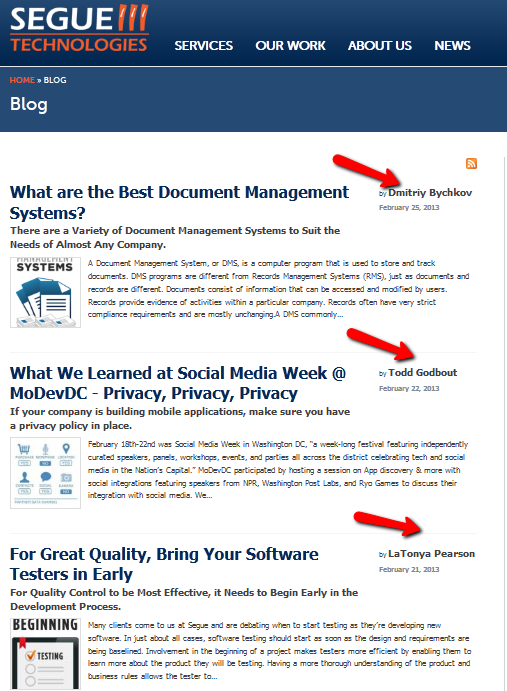Topics:
Content MarketingSubscribe now and get the latest podcast releases delivered straight to your inbox.
10 Reasons Why Employees SHOULD be Required to Participate in Blogging and Content Marketing

Feb 26, 2013

Over the last two years, I’ve had the opportunity to work with quite a few companies ranging from 1-200 employees in an effort to implement a culture of content marketing. With each of these companies and their content, we’ve always had 3 major goals:
1. Produce as much content as possible
2. Produce content that truly answers consumer questions and has value (quality)
3. Produce content that gets great results from a search standpoint (SEO/SCM)
With each of these critical goals, there has been one truism that stands out more than any other:
The greater the number of employees that help produce content, the more success the company has.
This makes perfect sense to most folks, but it begs a critical question, one that CEOs and Chief Marketing Officers are asking quite a bit these days:
Should blogging and content marketing be a required duty of employees?
Ahh yes, a very important question indeed.
But to cut to the chase, my answer is quite simple:
YES
Now that we’ve gotten that part of it out of the way, let’s talk about why. Here are 10 reasons to chew one, and I’d love to hear yours.
10 Reasons Blogging and Content Marketing Should be Required of Employees
1. Sheer numbers:
With the content arms race in full effect, the battle to take the content hill is pretty fierce, especially in industries that are on the cutting edge of marketing practices. This being said, the more (good) content, the better the results.
Unfortunately, for many businesses, even larger organizations, the marketing falls on the shoulders of just a few. To give you an example, I spoke to a company this past week that had hundreds of employees in “sales,” but less than a dozen in “marketing.” Crazy, huh?
But what would happen if this same company converted those hundreds of sales professionals into bloggers and content marketers? What would happen if each viewed themselves as a teacher with something very valuable to share to the world?
I can tell you what would happen: They’d blow up.
Hopefully, I’ll be telling you exactly how they blew up in about 12 months (once I get done with them ;-) ), but the days of this organization having no connection between sales and marketing is quickly coming to a close, and the results will be profound. Just think of it this way:
If a company has 100 sales people, and each writes(or helps write) one blog article every 4 months, how many total articles per year would that equate to?
Yep, 300, and that’s without causing a major burden on any singular person.
Now granted, I know most companies don’t have nearly this many employees, but even 3 employees contributing content on a consistent basis can work miracles in terms of generating more traffic, leads, and sales from content marketing.
The bottom line is “Insourcing” works. Do it.
 Companies like Segue Technologies (client) are leveraging their rich employee base to establish consistency, diversity, and quality with their company content.
Companies like Segue Technologies (client) are leveraging their rich employee base to establish consistency, diversity, and quality with their company content.
2. Diversity of thought and subject matter
What happens when only a few in the marketing department are the ones producing most of the content? I’ll tell you:
Everything starts to sound the same.
The opposite occurs when employees are producing content. Depending on the clients they deal with, the questions they answer every day, and the area they specialize in—there can be an incredibly vast array of diversity of content when multiple employees from multiple parts of the company are utilized to share their knowledge, stories, and experiences. I’ve seen this occur over and over again and it’s always one of the biggest surprises of management to see just how diverse their employees truly are.
3. Sales presentations and communication become much better.
This is one of the biggest secrets to blogging and content marketing that no one really talks about nor fully grasps until they’ve actually done it.
When I was selling swimming pools, I noticed the days I wrote blog articles about the industry and my products, my sales presentations were always crisper, stronger, and more on-point. This enhanced communication is simply a byproduct of putting your thoughts to pen (or video, audio, etc.) and distilling to the world exactly what you think and feel.
Now that I’m a silent partner in the pool business and writing/yapping about marketing all day, my ability to communicate in this arena has skyrocketed. But this was only made possible from countless hours of forcing myself to take the thoughts that were in my head and putting them down on paper in a way that was convincingly clear.
Simply stated, writing has a dramatic impact on verbal communication.
 When I was still a pool guy, writing about my industry and products sharpened my sales presentations and communication greatly, as is the case with any salesperson who blogs and produces content.
When I was still a pool guy, writing about my industry and products sharpened my sales presentations and communication greatly, as is the case with any salesperson who blogs and produces content.
4. Employees pay much greater attention to the content.
Just like any sports team, club, charity, etc.—those that participate are always the biggest advocates. The same applies to company’s content marketing efforts. In fact, if employees are assisting with the content, they are way more likely to share the content via their social media channels, talk about it, use it within the sales process, etc. This benefit alone can be worth its rate in gold.
5. People are now emotionally invested.
This one is similar to #4 but there is something very magical about seeing your name next to an article, an eBook, a whitepaper, etc. The majority of employees for companies big and small around the world do not currently see themselves as teachers, nor realize the value of their words and knowledge. This all can change the moment they put their name next to a piece of content and thereby take ownership.
 As I've discussed many times here on TSL, my friends at Block Imaging get amazing participation on their company blog from dozens of employees, much of which carries over into their belief in the company's mission and what they're doing.
As I've discussed many times here on TSL, my friends at Block Imaging get amazing participation on their company blog from dozens of employees, much of which carries over into their belief in the company's mission and what they're doing.
6. If it’s not required, they won’t do it. Nor will they take you seriously.
I’ve literally seen this time and time again. I have some clients that refuse to require a set amount of content from employees. With almost every single one of these, the employees don’t produce what has been “suggested” of them. On the other end of the spectrum, I’ve had clients (generally a CEO or CMO) tell employees, “This is who we are. This is what we do. It’s part of your job.”
Whenever this approach occurs, the production rates area generally 200-400% greater than the companies that simply “nudge” versus the requisite approach. Yes, the requirement method may not sound utopic, but it’s no different than any other job duty and expectation.
And one other point about this: When employees sense that management are not truly “all-in” with content marketing, a domino effect generally occurs, causing others to see it as “just another program” that will soon be terminated or drift off into the sunset as so many other “great ideas” before it.
7. Everyone is a teacher. It’s our job to help them realize that.
The profession of “teacher” is one of the most respected (although under-appreciated) in our society. With such a title comes pride—the pride of knowing you have influence for good on others. Content marketing, done right, is the pinnacle of teaching in my opinion. Simon Sinek often teaches about happiness in the work place, and the fact that most folks are so very unfulfilled when it comes to their “purpose” and “mission”. By taking the “teacher’s” approach of content marketing, many employees will find a sense of pride and purpose they never previously felt—something that can have a tremendous overall impact on the company morale.
8. Individual brands are built.
Companies that truly see the “big picture” want their employees to develop personally and elevate their individual brand and worth. As you might imagine, content marketing is one of the best ways these employees can do just that, and further develop themselves as thought leaders within their respective fields.
 Companies like Wegmans have done a tremendous job tapping in to their rich employee knowledge base, building individual brands along the way.
Companies like Wegmans have done a tremendous job tapping in to their rich employee knowledge base, building individual brands along the way.
9. It’s impossible to know who will be great until you get started.
I’ve worked with companies that started their content marketing efforts off with a small percentage of their total employee base, only to realize later on that they missed out on having some of their most talented teachers, writers, and communicators participate in the blog and content marketing efforts.
Without fail, there is always a diamond in the rough just waiting to show his or her talent to the rest of the company, and world for that matter, by embracing the content marketing opportunities.
10. It eventually becomes a culture.
Yes, the company blog and content marketing efforts may start off as a “program” to most employees, but eventually, it will become a culture, especially if everyone is actively engaged and made aware of the victories that come from all the content that has been produced. Although few companies have truly reached this point, I’ve seen it happen more than once, and when it does, the results on each individual and the collective group is a powerful and lasting one.
 In many ways, HubSpot was a pioneer in the blogging space because they tapped into their many employees to produce a prolific amount of content, the result of which is a true "culture" of education and a brand that is known to be one of the premier teachers in the inbound marketing realm.
In many ways, HubSpot was a pioneer in the blogging space because they tapped into their many employees to produce a prolific amount of content, the result of which is a true "culture" of education and a brand that is known to be one of the premier teachers in the inbound marketing realm.
Letting them Participate in a Way that Suits Them
On a final note, if you do decide to require your employees to write blog articles and produce content, I’d suggest you give them as many ways to do this as possible. Generally speaking, there are 3 methods of employee content extraction:
1. The employee writes the post
2. The employee makes a video post
3. The employee is interviewed by someone who then turns the information into a blog post and acts essentially as a ghost writer.
By allowing employees to choose one of these three methods, you’re much, much more likely to get full participation, as you have now overcome any potential obstacles/excuses that may have impeded a significant amount of work and progress. Also, a Chief Content Officer (anyone that can write well and understands the brand message) is a critical component of catching, filtering, and planning this entire content strategy, something I'll discuss much more of at a later time.
When all is said and done, the choice you make with your company’s content marketing and blogging efforts is an individual one, but hopefully these suggestions are enough to have you consider a full-blown cultural implementation.
No doubt, this stuff works, it’s just a matter of getting the work done.
Your Turn
So what’s your take? Do you think employees should be required to do this? Why? Give us your thoughts, I’d love to know your experiences with this important subject.


Order Your Copy of Marcus Sheridan's New Book — Endless Customers!